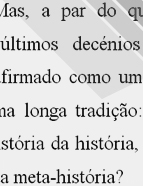

................................
In Portugal, especially during the long period of the Estado Novo, political positions became extremely polarised, either in support of or in opposition to the dictatorial regime. The historiographical field also reflected these divergences. Historians adopted distinct strategies in their relationship with political power. However, there was no necessary correlation between historiographical conceptions and political or philosophical tendencies. Significant examples illustrating this are the works of Paulo Merêa, Jorge Borges de Macedo, and António José Saraiva. Merêa, conservative in political terms, was a critic of positivism and an innovator in the field of legal and institutional history. The latter two, deeply influenced by the Marxist conception of history in the 1940s, diverged from it at different times (Macedo in the 1950s, Saraiva in the 1960s), producing unique works that renewed cultural and literary history. For example, see História da Cultura em Portugal [Cultural History in Portugal] (1950–62), under Saraiva, and História Diplomática Portuguesa [Diplomatic History in Portugal] (1987) under Macedo, integrating multiple historical dimensions, in particular the economic, political, and diplomatic. From the 1960s onward s, Jorge Borges de Macedo played a significant role in the study of Portuguese chroniclers and historians such as Damião de Góis, Pedro de Mariz, Rebelo da Silva, Alberto Sampaio, and 20th-century historians who had faded into obscurity for various reasons, such as Lúcio de Azevedo, Marcelo Caetano, and Ruben Andersen Leitão.
Macedo considered the historical thought of these authors within the broader context of the society in which they operated, taking into account their education, social networks, political connections, mentalities, relationships with cultural traditions, and conceptual innovations. It is notable that his inaugural lecture as a candidate for a full professorship focused precisely on Portuguese historiography and historians (Historiografia Portuguesa do Século XIX: Aspectos Fundamentais [19th Century Portuguese Historiography: Fundamental Aspects], 1967). He did not disregard major historians like Herculano and Jaime Cortesão. Nor did he neglect comprehensive studies in which he sought to examine the historiographical works of individual authors (1995) or to explore how, over the long term, British historiography interpreted the history of Portugal (1974). The differentiated characteri s ation of genres, the intentionality behind the works, and the audiences they targeted were key lines of study considered by this historian.
